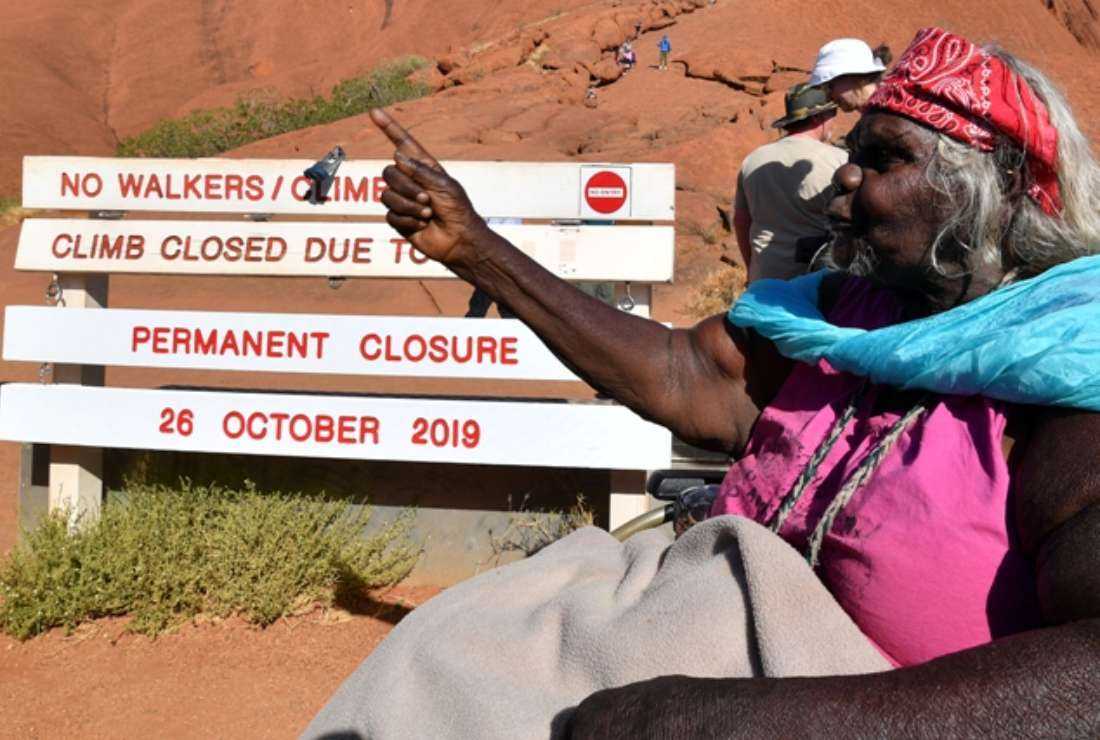
An aboriginal elder gestures near signage of a permanent ban on climbing Uluru, also known as Ayers Rock, ahead of the day's end marking the start of a permanent ban on climbing the monolith, at Uluru-Kata Tjuta National Park in Australia's Northern Territory on Oct. 25, 2019. Australia's Uluru was permanently closed to climbers to meet the wishes of Aboriginal people who hold the red monolith sacred. (Photo: AFP)
Lately, my attention was drawn to news from Australia in June that reported a ceremony taking place in Queensland to celebrate the renaming of Fraser Island — a World Heritage-listed island that lies just off the east coast — as K’gari, the original name used by the Butchulla people.
This recognition and honoring of the First Nation People’s culture and history is in sharp contrast to what I observed as the Japanese consul-general in Melbourne two decades ago. At that time, Australians were divided between liberals and conservatives, and the former’s argument for apologies to indigenous people was strongly resisted by the latter.
It took another decade for the declaration of apologies to materialize. In this context, I am impressed by the substantial change Australia has brought about.
Australian, Canadian and American authorities pursued similar policies in the past, of forcefully separating indigenous children from their families and admitting them to boarding schools or white families. They were stripped of their traditional cultures, languages and religions, and English and Christianity were imposed upon them.
These policies are often termed “cultural genocide.” But to me, they should be more accurately termed as “ethnocide.”
It is important to note that this inhumane, brutal policy of forced assimilation was carried out with the slogan of “civilizing uncivil people.”
"The Chinese government justifies its policies as serving the bigger cause of 'civilizing and modernizing uncivil people'"
In any case, these policies of “ethnocide” lasted for 70 to 150 years in the three countries, until sometime in the late 20th century when the paradigm shift began by recognizing indigenous rights.
Around 2005-2010, the paradigm change was further advanced, and all three countries finally and formally apologized for the said dark histories.
I hereby would like to touch upon my concerns in two respects.
First, now that the US and others have made the “conversion,” it is time to look at today’s “champion of the ethnocide.” And it is none other than China.
The massive detainment of the Uyghurs and the policies of “de-Uyghurization,” the de-Islamization, as well as the sinicization of the north-western province of Xinjiang, are a reminder of what Australia, Canada and the US did some five to 10 decades ago.
The Chinese government justifies its policies as serving the bigger cause of “civilizing and modernizing uncivil people,” exactly in the manner as Australia and the others did in the past.
Sinicization, a process aiming to assimilate people into authentic Chinese culture, is also underway in Inner Mongolia as well as in Tibet. The process of de-localization of cultures takes place in these places too, though to a lesser degree than in Xinjiang.
Against this backdrop, the US and the other two nations better tell China, “Don’t repeat the same mistake as we did in the past.” By doing so, I believe, they could enliven, empower and strengthen their argument ten fold.
Many countries may well be impressed by their candor. Hence, I would like to appeal to the US and the two other nations to stop repeating a simplistic criticism of China as they do now.
"The federal government has a tendency of showing disregard for indigenous faith, whereas less so for Christianity"
Second, I would like to focus attention on the western part of Arizona, the home of San Carlos Apache and other tribes. For centuries, they revered Oak Flat, a plateau in central Arizona, as a sacred and important religious site.
Lately, however, the federal government, the actual owner of the land, decided to mine copper deposits beneath the site.
Infuriated by the decision, the indigenous people took the government to court. They said that establishing a mine there would violate their religious freedom by destroying the center of their faith.
It is being said that the federal government has a tendency of showing disregard for indigenous faith, whereas less so for Christianity.
The lower courts upheld the federal government’s stance and the case will eventually move up to the Supreme Court. The current bench there is said to have more sympathy for religious freedom than before.
I am wondering if the final court regards the indigenous faith in the same manner as Christianity, though the issue is multifaceted and complex — at stake are a huge amount of money, natural resources and the environment.
Last but not least; I would like to add that the indigenous faith in point is based upon “animistic cosmovision,” hence rather similar to the Japanese cosmovision, a basis of Shintoism. The Shintoists are thus encouraged to give a word of support and solidarity to “the American Shintoists.”
This case reminds me of a similar case in Australia.
At Uluru, previously known as Ayers Rock, a sacred place to the local indigenous tribe, the local government was willing to attract more tourists by allowing them to climb the site. The indigenous people, the real owners of the sacred site, however, preferred banning the climbing.
After a tug-of-war that lasted many years, the indigenous custodians, the Anangu people, finally managed to make their sacred Uluru permanently off limits to climbers in October 2019, winning due respect for their religion and preserving the spiritual significance of the site.
Uneno Kagefumi is a former Japanese Ambassador to the Holy See (2006-10). The views expressed in this article are those of the author and do not necessarily reflect the official editorial position of UCA News


